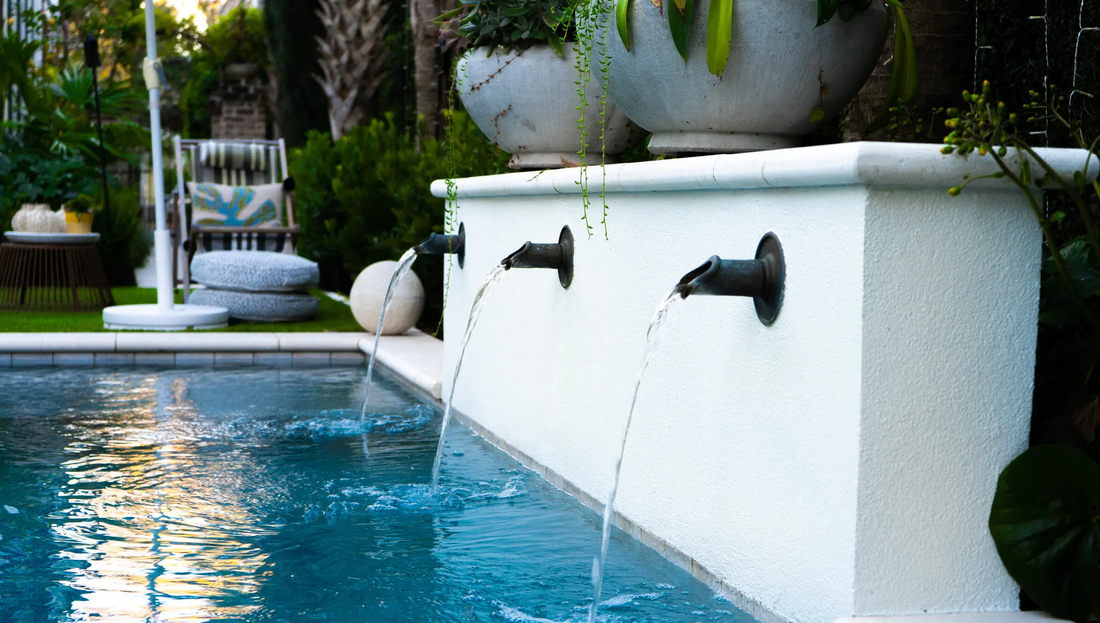
The Advantages of Plastic Pool Scuppers Over Metal
Share
When designing or renovating a pool, choosing the right materials can dramatically affect both the aesthetics and long-term upkeep. Pool scuppers, essential for creating cascading water effects that enhance the pool’s visual and auditory experience, have traditionally been made from metals like copper or stainless steel. However, plastic scuppers are emerging as a superior alternative due to their durability, cost-effectiveness, and low maintenance. This post explores why plastic pool scuppers are a smart choice over metal.
Resistance to Corrosion
One of the most significant advantages of PVC plastic over metal in any pool setting is its superior resistance to corrosion. Metal scuppers can corrode over time when exposed to pool chemicals like chlorine and saltwater, which can lead to leakage, staining, and the need for frequent replacements. PVC plastic, on the other hand, is naturally resistant to corrosion. It does not react with chlorinated water, salt water, or the chemicals commonly used in pool maintenance, ensuring that the scuppers maintain their functionality and appearance for much longer without the need for constant upkeep.
Cost-Effectiveness
Cost is a critical factor in pool construction and renovation. Metal scuppers, while durable, are significantly more expensive not only in initial costs but also in long-term maintenance. Plastic scuppers are far more economical. They offer a lower upfront cost and minimize future expenses related to replacements and repairs. For budget-conscious homeowners or commercial properties with extensive pool features, PVC provides an attractive cost-saving alternative without compromising quality.
Reduced Risk of Theft
Theft of metal fixtures has become a concern due to the rising value of metals. Metal scuppers are at risk of being stolen for their scrap value, posing a security risk and potentially incurring high replacement costs. Plastic scuppers present a less appealing target for theft due to their minimal scrap value, providing an added layer of security and peace of mind for property owners.
Longevity and Maintenance Needs
Plastic’s durability extends beyond its resistance to corrosion. It is also less prone to damage from physical impacts and environmental conditions such as UV exposure. Unlike metal, plastic does not dent or deform easily, which maintains its structural integrity and aesthetic appearance over time. Additionally, plastic scuppers require little maintenance beyond routine cleaning, without the need for protective coatings or corrosion inhibitors that metal scuppers often require.
Overall Cost-Efficiency
Combining the factors of lower installation costs, minimal maintenance, and enhanced durability, plastic scuppers offer superior overall cost-efficiency. For commercial developers and residential homeowners alike, choosing plastic can lead to significant savings over the lifespan of the pool, freeing up resources for other enhancements or operational needs.
Conclusion
The shift from metal to plastic pool scuppers represents a broader trend towards innovative, cost-effective solutions in pool design. Plastic not only meets but often exceeds the performance and aesthetic standards set by traditional materials, making it an excellent choice for new projects and renovations alike. Whether you are a builder, designer, or homeowner, considering plastic for your next pool scupper installation could result in a more durable, affordable, and low-maintenance pool environment.
